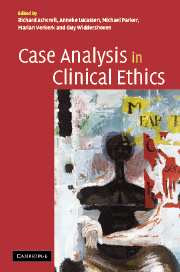Book contents
- Frontmatter
- Contents
- Notes on contributors
- Acknowledgements
- 1 Philosophical introduction: case analysis in clinical ethics
- 2 Families and genetic testing: the case of Jane and Phyllis
- 3 Family access to shared genetic information: an analysis of the narrative
- 4 A virtue-ethics approach
- 5 Interpretation and dialogue in hermeneutic ethics
- 6 ‘Power, corruption and lies’: ethics and power
- 7 Reading the genes
- 8 A utilitarian approach
- 9 A feminist care-ethics approach to genetics
- 10 A conversational approach to the ethics of genetic testing
- 11 Families and genetic testing: the case of Jane and Phyllis from a four-principles perspective
- 12 A phenomenological approach to bioethics
- 13 An empirical approach
- 14 Response to ethical dissections of the case
- 15 Philosophical reflections
- Index
- References
10 - A conversational approach to the ethics of genetic testing
Published online by Cambridge University Press: 01 September 2009
- Frontmatter
- Contents
- Notes on contributors
- Acknowledgements
- 1 Philosophical introduction: case analysis in clinical ethics
- 2 Families and genetic testing: the case of Jane and Phyllis
- 3 Family access to shared genetic information: an analysis of the narrative
- 4 A virtue-ethics approach
- 5 Interpretation and dialogue in hermeneutic ethics
- 6 ‘Power, corruption and lies’: ethics and power
- 7 Reading the genes
- 8 A utilitarian approach
- 9 A feminist care-ethics approach to genetics
- 10 A conversational approach to the ethics of genetic testing
- 11 Families and genetic testing: the case of Jane and Phyllis from a four-principles perspective
- 12 A phenomenological approach to bioethics
- 13 An empirical approach
- 14 Response to ethical dissections of the case
- 15 Philosophical reflections
- Index
- References
Summary
Recognition and respect for personhood
In his book Humanity: A Moral History of the Twentieth Century, Jonathan Glover suggests that the inhumane treatment of human beings is made possible by the failure or refusal to see them as persons (Glover 2001). It does not follow from this that the ability to see people as persons will necessarily lead one to respect their personhood. Nevertheless, it does suggest that the ability (or willingness) to recognise personhood in others, to see them as persons like ourselves, can have an important role to play in creating sensitivity to the morally relevant features of situations such as the one described by Anneke Lucassen, and it may mean that we are more likely as a result to be respectful of the personhood of those with whom we come into contact in our personal or professional lives. The demand for reciprocal recognition of and respect for personhood – that is the requirement that those making moral judgements ‘place themselves in the shoes’ of those about whom or for whom a decision is being made – has a long history in moral philosophy, as has another related requirement, that we should ‘treat others as we would wish ourselves to be treated’, the so-called Golden Rule. Why is this and why is it that the desires, wishes and interests of people are of special moral importance?
- Type
- Chapter
- Information
- Case Analysis in Clinical Ethics , pp. 149 - 164Publisher: Cambridge University PressPrint publication year: 2005



